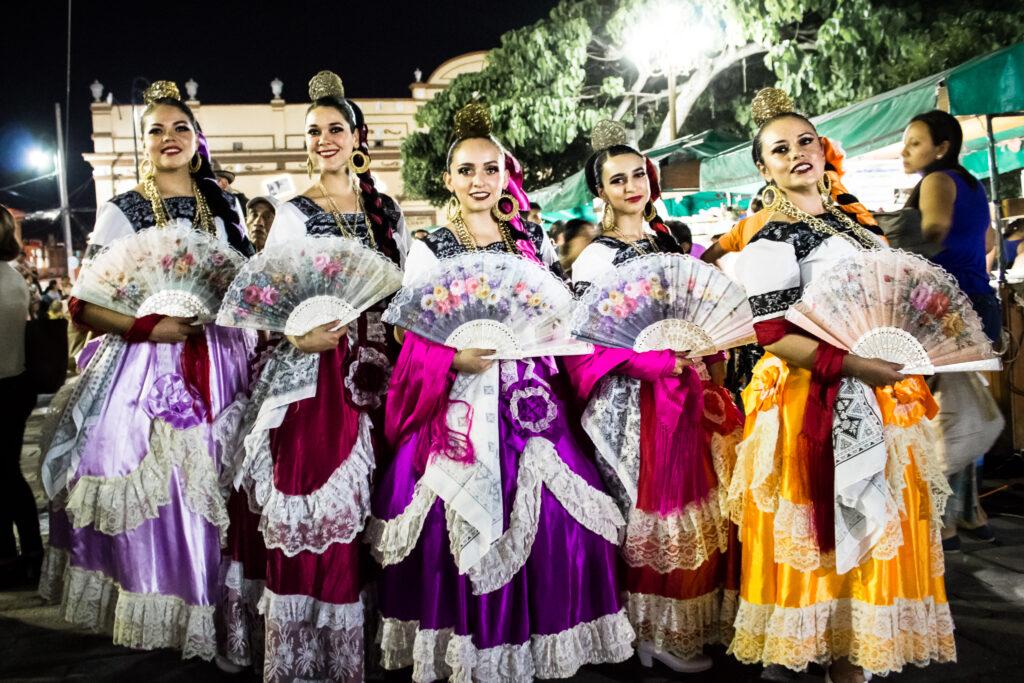The Georgetown Americas Institute hosted Amalia Viviana Basanta Hernández, the artistic director of Ballet Folklórico de México, at the Gonda Theater on Aug. 28 to discuss the importance of dance as a form of cultural diplomacy.
Folklórico is a genre of dance that fuses classical ballet movements and choreography with local folk culture: dancers often wear traditional costumes like colorful dresses and skirts while performing to mariachi music. Ballet Folklórico de México, a prominent dance company based in Mexico that Hernández’s mother, also named Amalia Hernández, founded in 1952, has performed for worldwide tours, including in front of presidents John F. Kennedy and Bill Clinton.
Hernández hopes that the traditional choreography gives Mexican Americans and folklórico dancers a chance to connect with their cultural roots and cultivate a deep appreciation for their heritage.
“What we really want to share is what is the roots, what are they doing, and making them love where they come from and not be ashamed,” Hernández said at the event. “Be proud from where you come, and be proud to be here, making what you want in a country that lets you grow. I think it makes our roots and our present stronger.”
Hernández discussed at the event her company’s role as a prominent Mexican cultural ambassador with Georgetown Ph.D. student Victoria Saeki-Serna (GRD ’28), a dedicated folklórico dancer since the age of eight.
Saeki-Serna is currently pursuing studies in U.S.-Mexican relations during the Cold War while actively participating in Corazón Folklórico, a non-profit organization dedicated to showcasing Mexican folk dance in Washington, D.C., and providing free dance classes for adults.
Saeki-Serna said that it was an honor to have the opportunity to have Hernández speak on campus because she started attending Hernández’s masterclasses at a young age.
“Just being able to have this event with her to me was incredible because I would have never imagined as a 13-year-old when I first met her that I’d be sitting across from her on a stage essentially holding a conversation with her at my own school,” Saeki-Serna told The Hoya. “She just seemed like this incredible figure I can never quite reach.”
Hernández and Saeki-Serna said that Ballet Folklórico has a crucial role to play in sharing Mexican culture worldwide.
“The ballet helps really humanize Mexico and these diplomatic relations,” Saeki-Serna told The Hoya. “From what I’ve seen in my research, the ballet has been absolutely fundamental at building Mexico soft power in this way.”

Hernández said that her career would not be possible without her mother, who brought folklórico to America and dedicated herself to preserving the authenticity of the dances as they were performed in Mexico. Inspired by her mother, Hernández regularly travels outside of Mexico City to conduct research and connect with small villages all over Mexico.
“My mother was very creative,” Hernández said. “She had a lot of ways to understand not to repeat what she saw but to translate what was the language of the Mexican roots. She used to go to the small towns and when someone was selling a dress she always asked for a lower price so they started telling the history of the dress.”
Hernández also runs México en Movimiento, a Mexican contemporary dance company, and Ballet de México de Amalia VB Hernández USA, a satellite program of Academia de Danza Amalia Hernández (ACADEZ), which hosts master classes serving students in the United States, including in New York, Tulsa, Okla. and Milwaukee.
Saeki-Serna, who has been taking the masterclasses since she was a child, said ACADEZ has introduced her to Mexican Americans all over the country and has served as an important way to connect with her culture.
“ACADEZ has been a huge pleasure, not only because you get to teach us, but because people who might not have the opportunity to go back to Mexico as much as they wish have a chance to get in touch with those roots through dancing,” Saeki-Serna said.
Hernández’s work has been influential in spreading Mexican culture to both folklórico dancers and the rest of the world through her masterclasses, choreography and passion.
“I’ve been taking master classes from her every chance I get ever since and I can confidently say she is one of the most important role models in my life,” Saeki-Serna said. “Not only because of her position as the artistic director but also because she is such a genuinely caring human being, that really inspires me to be proud of my Mexican heritage.”














